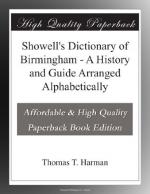West.—Though he did not come to Birmingham until close upon sixty years of age, being born in 1770, William West, in his “History of Warwickshire,” published one of the best descriptions of this town ever yet prepared. He had establishments in London and Cork, and was the author of several amusing and interesting works, such as “Tavern Anecdotes,” “Fifty Years’ Recollections of an Old Bookseller.” &c., now scarce, though “West’s Warwickshire” may often be met with at the “Chaucer’s Head,” and other old bookshops.
Williams, Fleetwood, who died in 1836, at the early age of 29, was the author of sundry locally interesting prose works and poetical “skits.” He was connected with several debating clubs, and showed talent that promised future distinction.
Willmore.—James Tibbets Willmore, a native of Handsworth, was an eminent landscape engraver, famed for his reproductions of Turner’s works. His death occurred in March, 1863, in his 63rd year.
Winfield.—Mr. Robert Walter Winfield, though he took comparatively little part in the public life of our town, deserves a prominent place among our men of note as a manufacturer who did much towards securing Birmingham a somewhat better name than has occasionally been given it, in respect to the quality of the work sent out. Starting early in life, in the military ornament line, Mr. Winfield began in a somewhat small way on the site of the present extensive block of buildings known as Cambridge Street Works, which has now developed into an establishment covering several acres of land. Here have been manufactured some of the choicest specimens of brass foundry work that could be desired, no expense being spared at any time in the procuring of the best patterns, and (which is of almost equal importance) the employment of the best workmen. The goods sent from Cambridge Street to the first Great Exhibition, 1851, obtained the highest award, the Council’s Gold Medal, for excellence of workmanship, beauty of design, and general treatment, and the house retains its position. Mr. Winfield was a true man, Conservative in politics, but most, truly liberal in all matters connected with his work-people and their families. In the education and advancement of the younger hands he took the deepest interest, spending thousands in the erection of schools and the appointment of teachers for them, and not a few of our present leading men have to thank him for their first step in life. The death of his only son, Mr. J.F. Winfield, in 1861, was a great blow to the father, and caused him to retire from active business through failing health. His death (Dec. 16, 1869), was generally felt as a loss to the town.




